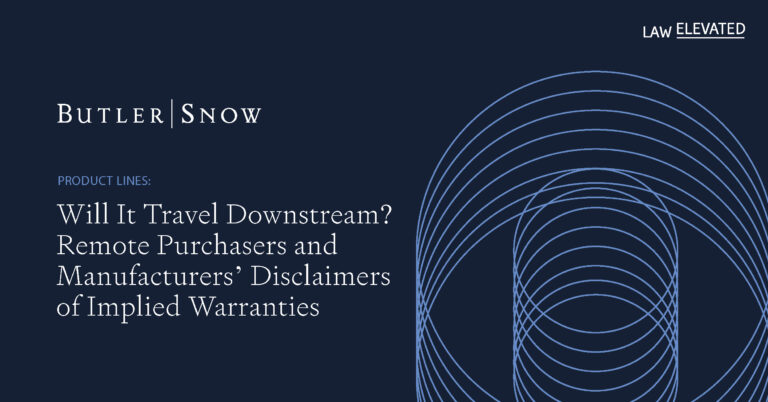From the perspective of both buyer and seller, warranties are an important part of any commercial transaction. It is well established that the Uniform Commercial Code (the “UCC”) will imply certain warranties into some contracts unless they are sufficiently disclaimed.
Take, for example, the warranty of merchantability. Section 2-314 of the UCC provides that “a warranty that the goods shall be merchantable is implied in a contract for their sale if the seller is a merchant with respect to goods of that kind.” But Section 2-316 of the UCC also provides mechanism to disclaim that implied warranty. It provides that the warranty of merchantability may be disclaimed if the written contract (1) contains a conspicuous written disclaimer that expressly mentions “merchantability” or (2) includes an expression stating that the goods are sold “as is” or “with all faults.”[1] In other words, sellers maintain some tools that allow them to control their exposure.
But what about a situation where a manufacturer sells its product to a wholesaler who in turn sells it to a retailer where it is ultimately purchased by a consumer? Assuming that the ultimate buyer can bring an action against the manufacturer for breach of an implied warranty, will a court recognize the manufacturer’s disclaimer? Some courts have held that “a downstream purchaser cannot obtain a greater warranty than that given to the original purchaser, so if the manufacturer at the point of original sale makes a valid disclaimer of implied warranties, that disclaimer extends to subsequent purchasers.” MAN Engines & Components, Inc. v. Shows, 434 S.W. 3d 132, 140 (Tex. 2014). See also AIG Eur., Ltd. v. Caterpillar, Inc., 831 F. App’x 111, 117 (5th Cir. 2020) (similar); Heritage Resources, Inc. v. Caterpillar Financial Services Corp., 774 N.W.2d 332, 345 (Mich. App. 2009) (“a remote purchaser is subject to the manufacturer’s disclaimer of implied warranties in the same manner as is the original purchaser, and can acquire no greater implied-warranty rights from the manufacturer than the original purchaser can.”).
While rulings like these would give peace of mind to manufacturers, not all courts have reached the same conclusion. For example, the United States District Court for the Eastern District of Oklahoma rejected a manufacturer’s argument that its disclaimer became binding on the ultimate purchaser. See Telco Supply Co. v. Remee Prod. Corp., No. CIV-13-207-RAW, 2014 WL 4826648, at *3 (E.D. Okla. Sept. 29, 2014).
Given the uncertainty in the law on this point and the variances across jurisdictions, manufacturers who sell products to retailers nationwide should take particular care to ensure that its disclaimer is effective with respect to the ultimate purchaser. As one court has reasoned, “there is no reason that the defendant cannot disclaim its warranty liability by policing its dealers and making sure that its disclaimer reaches the ultimate user of its product during the negotiations for the product’s sale.” Peterson v. N. Am. Plant Breeders, 218 Neb. 258, 266, 354 N.W.2d 625, 632 (1984). What this looks like will vary. While manufacturers could attempt to require their buyers to notify the retail purchaser of the disclaimer (paired with an indemnity provision), another approach is for the manufacturer to affix the disclaimer physically to the product in such a way so as to ensure it reaches the end purchaser.
Even then, a manufacturer may find it difficult to enforce such disclaimers or limitations of remedies (addressed under UCC Section 2-719) unless the same are deemed to be part of the basis of the bargain as opposed to a post-sale modification imposed by the manufacturer with no acquiescence or acknowledgement by the purchaser. In Bowdoin v. Showell Growers, Inc., 817 F. 2d 1543 (11th Cir. 1987), for example, the Eleventh Circuit Court of Appeals reversed the district court’s finding that a warranty disclaimer by a spray rig manufacturer included as part of the product’s instruction manual could effectively preclude claims by the ultimate purchaser for breach of the implied warranty of merchantability or fitness for a particular purpose. The court concluded that plaintiffs had received no notice of such warranty limitations at the time they purchased the product from an authorized distributor. As such, they could not be bound by such limitations where the product manual was simply included among other documents received by plaintiffs in conjunction with the sale after the product was delivered. But see Goode v. Franklin Welding and Equipment Co., 50 Va. Cir. 441 (1999) (warranty disclaimer documents acknowledged by purchaser after product delivery may modify a purchase contract and limit a purchaser’s potential remedies).
Admittedly, the Fifth Circuit has reasoned that a manufacturer can disclaim implied warranties “by doing so in the materials he includes with the goods . . . . or by joining as a disclaiming seller in the contract between the retailer and the remote purchaser.” Clark v. DeLaval Separator Corp., 639 F.2d 1320, 1324 (5th Cir. 1981). Though, with the Eleventh Circuit’s holding in Bowdoin, manufacturers are right to be concerned about ensuring that the disclaimer reaches the ultimate purchaser’s hands before the product is used. One strategy that may offer protection in such jurisdictions is to physically affix the disclaimer to the product and to state that by removing the disclaimer and using the product rather than returning it, the purchaser is expressing its understanding of the terms and conditions.
[1] An implied warranty can also be excluded by course of dealing, course of performance, or usage of trade. UCC 2-316(3).
